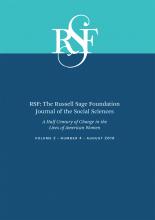Abstract
As women's labor-force participation and earnings have grown, so has the likelihood that wives outearn their husbands. A common concern is that these couples may be at heightened risk of divorce. Yet with the rise of egalitarian marriage, wives’ relative earnings may be more weakly associated with divorce than in the past. We examine trends in the association between wives’ relative earnings and marital dissolution using data from the 1968–2009 Panel Study of Income Dynamics. We find that wives’ relative earnings were positively associated with the risk of divorce among couples married in the late 1960s and 1970s, and that this was especially true for wives who outearned their husbands, but this was no longer the case for couples married in the 1990s. Change was concentrated among middle-earning husbands and those without college degrees, a finding consistent with the economic squeeze of the middle class over this period.
- Copyright © 2016 by Russell Sage Foundation. All rights reserved. Printed in the United States of America. No part of this publication may be reproduced, stored in a retrieval system, or transmitted in any form or by any means, electronic, mechanical, photocopying, recording, or otherwise, without the prior written permission of the publisher. Reproduction by the United States Government in whole or in part is permitted for any purpose. This research was carried out using the facilities of the Center for Demography and Ecology at the University of Wisconsin-Madison (R24 HD047873). The collection of data used in this study was partly supported by the National Institutes of Health (R01 HD06909) and the National Science Foundation (1157698). A previous version of this paper was presented at the 2015 Population Association of America in San Diego, CA. We are grateful to Martha Bailey, Tom DiPrete, Kei Nomaguchi, Christopher McKelvey, and the participants of the Russell Sage Foundation conference “Changing Roles and the Status of Women” for helpful comments and advice. Direct correspondence to: Christine R. Schwartz at cschwart{at}ssc.wisc.edu, Department of Sociology, University of Wisconsin-Madison, 1180 Observatory Drive, Madison, WI 53706; and Pilar Gonalons-Pons at pgonalons{at}soz.uni-frankfurt.de, School of Social Sciences (FB03), Goethe University Frankfurt am Main, Theodor W. Adorno Platz 6, 60629 Frankfurt am Main, Germany.
Open Access Policy: RSF: The Russell Sage Foundation Journal of the Social Sciences is an open access journal. This article is published under a Creative Commons Attribution-NonCommercial-NoDerivs 3.0 Unported License.






